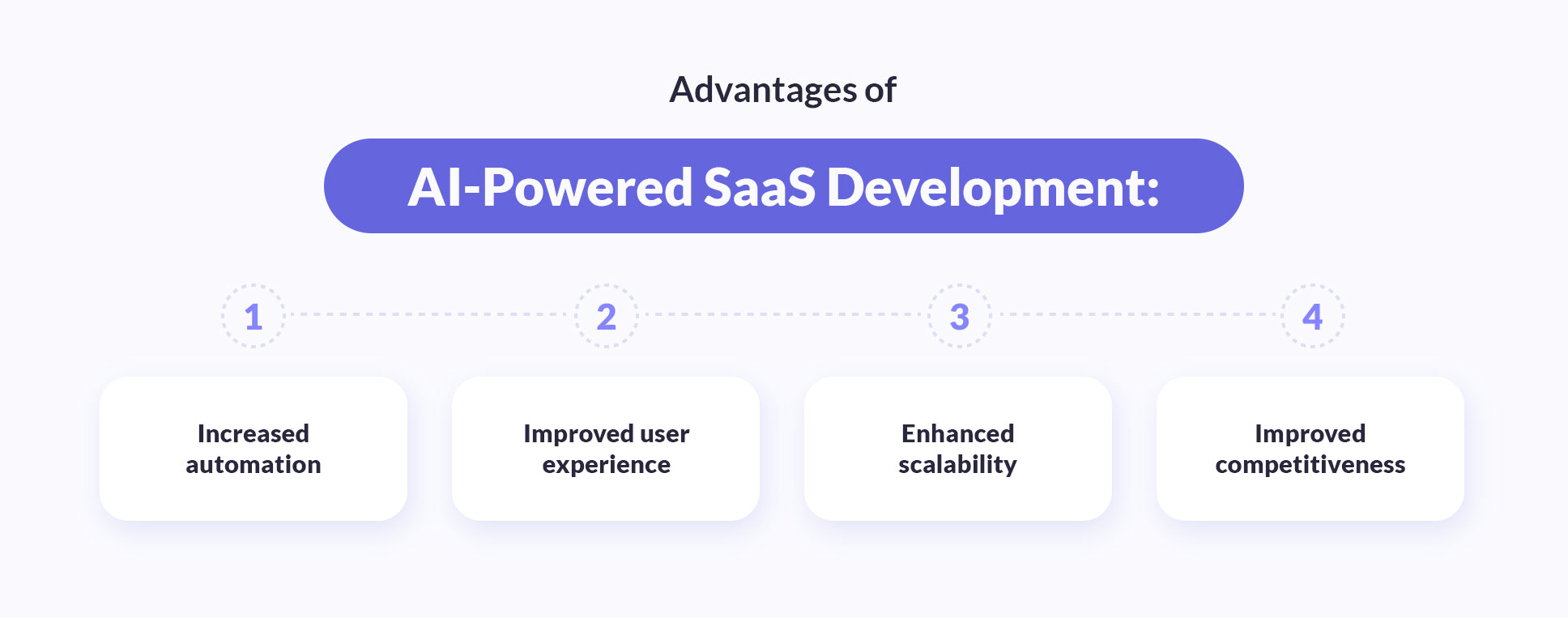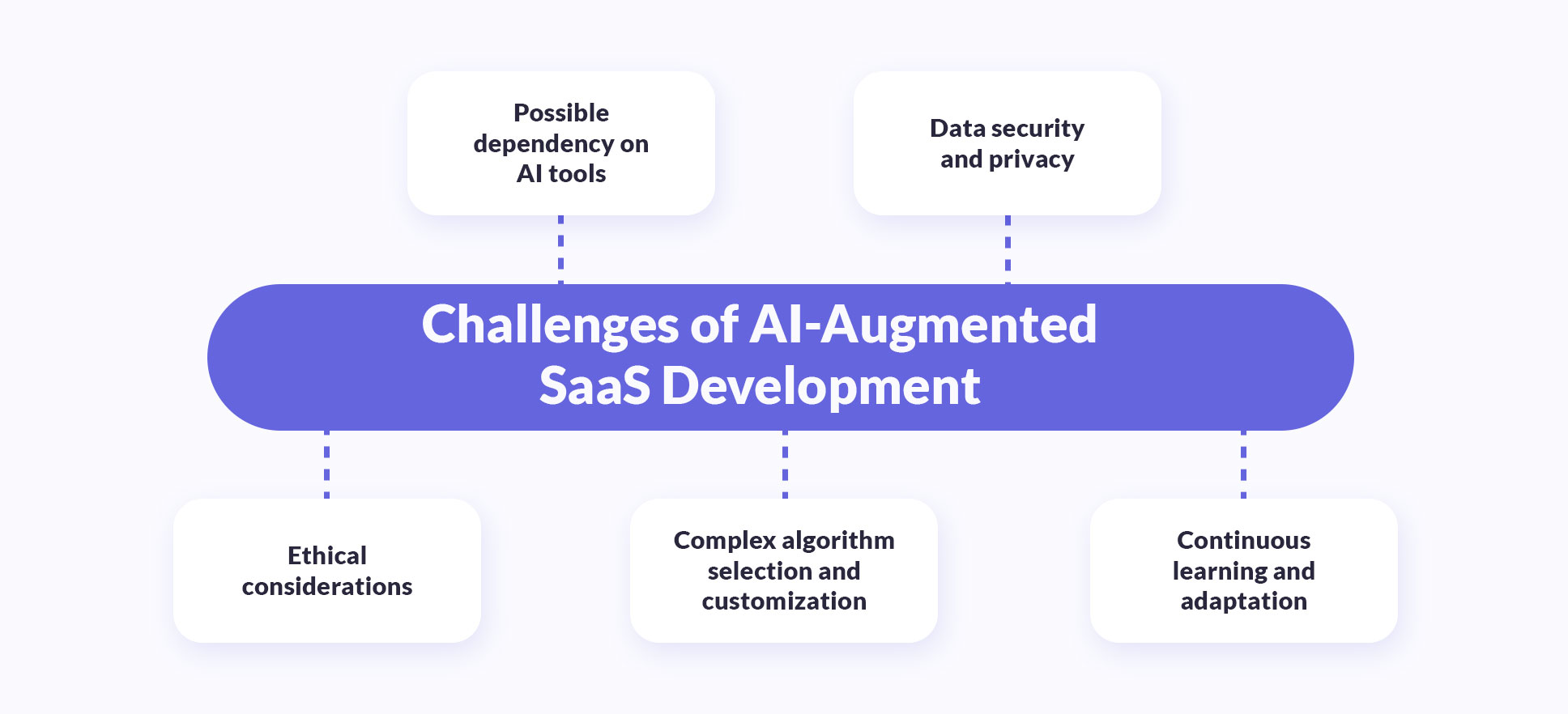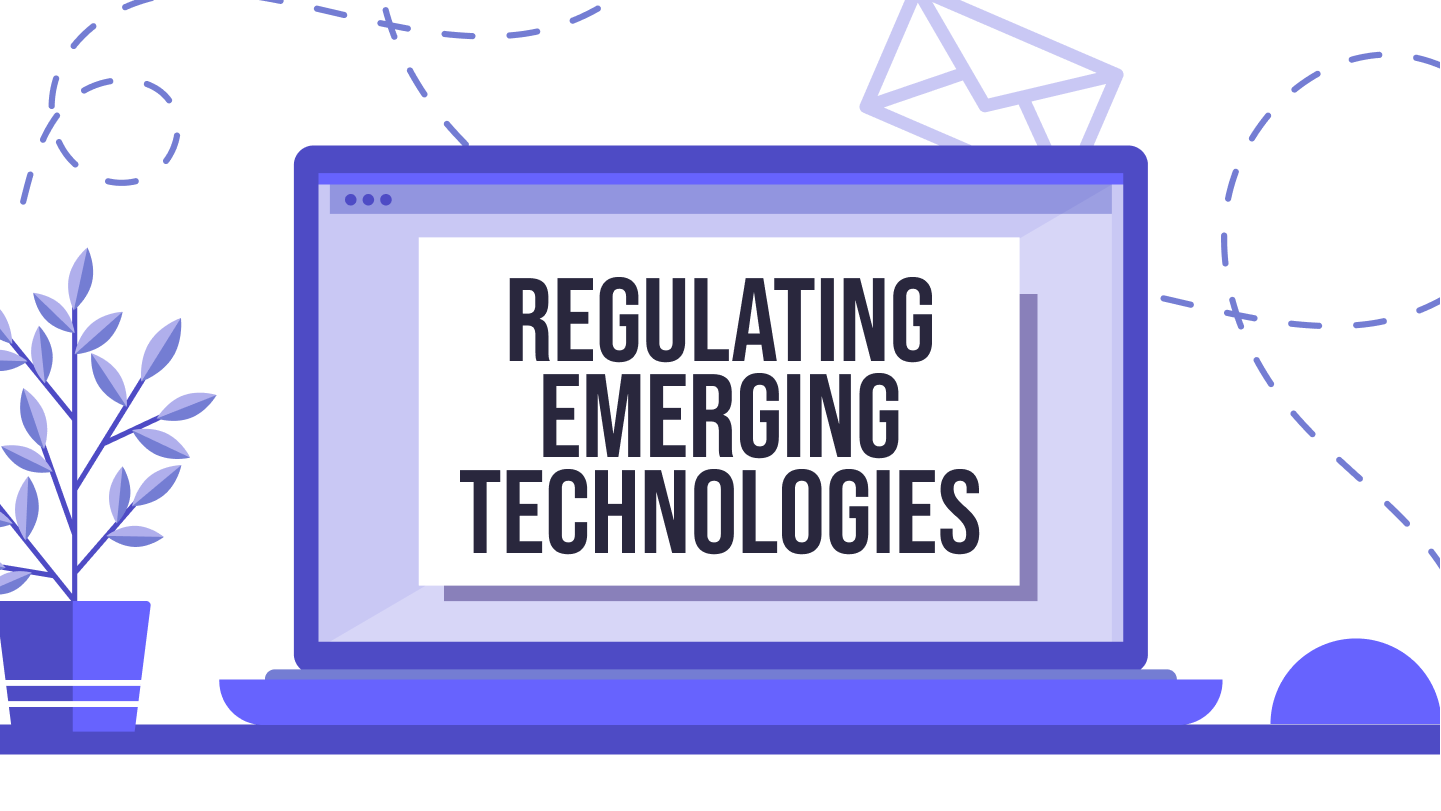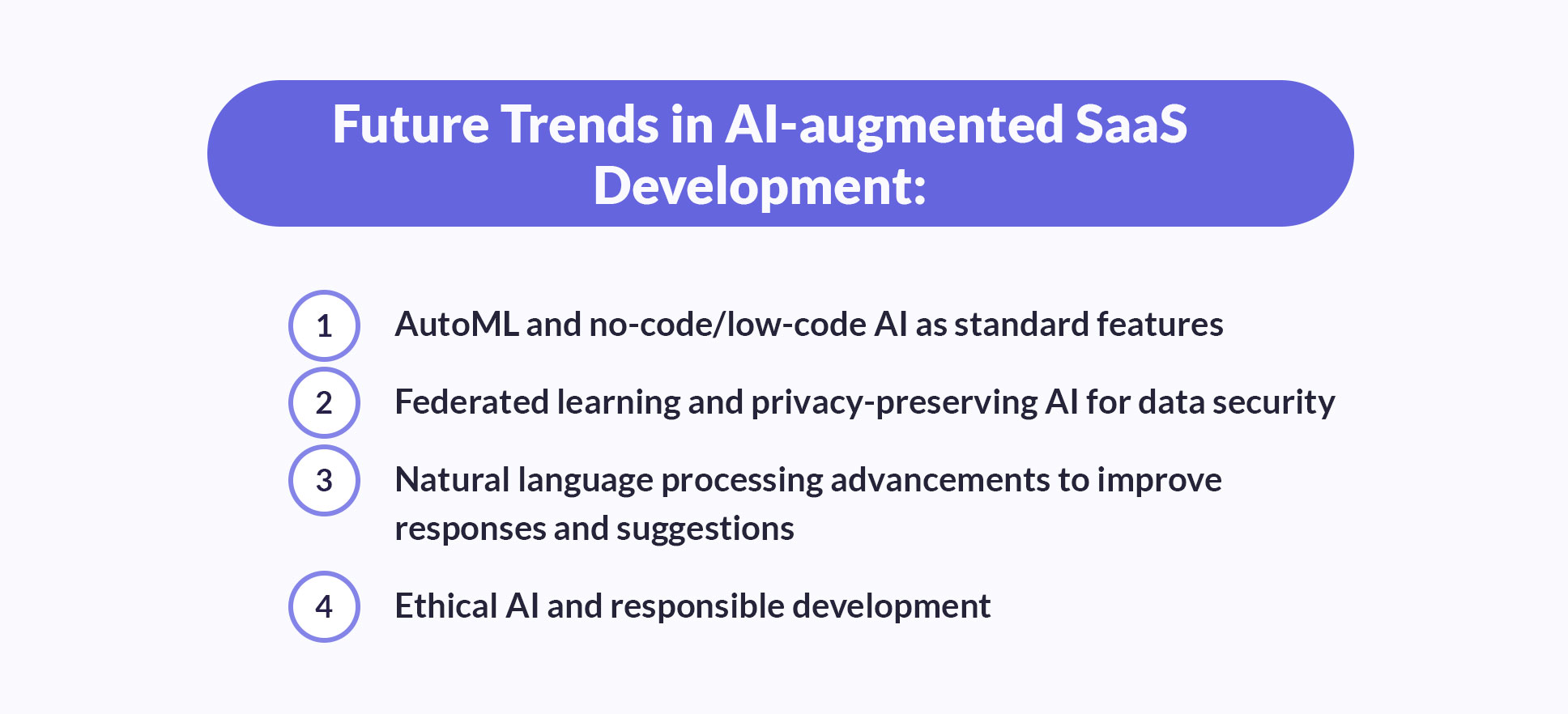In the 2000s, Software as a Service (SaaS) solutions spread throughout all industries. With the new advancements in AI in the SaaS landscape, estimates say 99% of all companies will use at least one SaaS solution before the end of 2023. The benefits, such as cost, scalability, and accessibility, cannot be ignored.
So what can artificial intelligence (AI) do to advance the acceptance of SaaS in business? It can provide more time for developers to focus on complex solutions. We can automate tasks that are time-consuming, and repetitive, such as writing and reviewing code, highlighting problem areas, and suggesting possible solutions.
Join us as we explore the role of implementing AI in SaaS businesses and how augmented development can help companies build and launch better products faster.
The concept of AI-augmented development in SaaS
Let’s start with a brief definition of AI-augmented development. Broadly, it means creating more reliable and effective apps with AI-powered tools and platforms to assist the developers’ efforts. It is by no means a replacement for human intelligence. Rather, it helps humans be more efficient and make better-informed decisions.
Power of AI can help SaaS companies:
- simplify processes;
- inspire innovation;
- improve customer engagement.
Here’s how AI-based SaaS businesses can provide a competitive edge:
- Creating content. Generative AI can create various types of content, including text, engaging videos, high-quality images, and graphics. Marketers can easily input brand elements and create templates and high-quality content to boost engagement.
- Automating tasks. Task automation can boost efficiency and employee satisfaction. It ensures business operational efficiency. Developers can use it to request additional resources, migrate code, and complete various HR tasks faster and easier.
- Personalizing marketing efforts. Through customer data analyzes, AI driven tools can create highly personalized marketing campaigns to engage and convert customers. Using dynamic content, marketers can emphasize the right things, precisely target the individual customer and their pain point, and offer the right solution at the right time.
- Improving customer support. AI-powered chatbots and virtual assistants can do a lot for customer service. They provide relevant information and reduce wait times. Customers can get instant answers, recommendations, and support, which will improve their loyalty to the brand.
- Translating and processing natural language. Removing language barriers by accurately translating speech in real time can boost business growth in new SaaS markets. Companies will no longer have to limit their reach or use expensive experts to enter foreign markets.
Staying relevant and competitive in today’s marketplace is challenging. Using the technological benefits of artificial intelligence is a prerequisite for companies, large and small, across many industries.
Let's cooperate!
Looking for AI-powered app development? Our team is ready to provide innovative ideas that will transform your business
Advantages of AI SaaS development
Developing AI driven systems bring many advantages to businesses. Features such as predictive analytics and intelligent automation can empower SaaS companies and drive business growth.
Here’s how:
Increased automation. When you automate processes, you can save more time, money, and effort. Employees will have useful AI tools to complete their work more quickly and efficiently. Task automation will, therefore, raise employee satisfaction and reduce turnover rates. No task will be left behind, which means no missed deadlines. With the right solutions, your business can run like a well-oiled machine.
Improved user experience. AI driven tools can help optimize your SaaS products by constantly evaluating customer behavior and identifying trends and patterns. That way, you can quickly identify and add important features and respond to vital requests. Merging SaaS services with AI can also create eye-catching designs to improve customer experience.
Enhanced scalability. By using AI driven tools in software development, you can have a smaller IT team at hand. You will also get more work done faster, driving costs down and revenue up. With more productivity and fewer related costs, your SaaS AI business can start to grow and scale.
Improved competitiveness. Competition drives progress, and employing AI and SaaS combination in your business can make you more competitive in the market. Otherwise, you may get overcome by competitors who embrace AI technologies and put them to good use.
Predictive analytics. AI SaaS businesses can use predictive analytics to anticipate user needs and behavior. By advanced data analysis, AI algorithms can predict future user actions, allowing companies to proactively address user needs and provide personalized experiences. For example, a customer support chatbot can use predictive analytics to anticipate customer requests and offer appropriate solutions in advance.
Cybersecurity. AI-powered automation can help you protect your SaaS product, data, and customers from cyberattacks and breaches, ensuring automated fraud detection. For example, you can use AI-powered tools to automate threat detection, prevention, and response. You can also implement AI tools to monitor and audit your AI SaaS products, data, and users. Some examples of AI-based SaaS product automation for security include Darktrace, which helps security teams detect and stop cyberattacks, Stripe, which helps security teams prevent and combat fraud, and Okta, which helps security teams manage and protect user identities and access.
- Cost Savings. AI SaaS platforms can save you money by automating everyday tasks and making your processes more efficient. Plus, it helps cut down on infrastructure costs and reduces the need for extra hands, giving you more bang for your buck in the long run. With AI applications optimizing, everything from resource allocation to data processing, you can focus your budget on growth instead of maintenance. Over time, this leads to significant cost reductions, especially as your business scales.
While more competition doesn’t sound like a major benefit initially, it can further innovation efforts and increase your SaaS business potential. This is especially true for tech companies.

SaaS and AI: development challenges and considerations
Artificial intelligence is the future, but we may not be completely there yet. There are still valid concerns about its use in everyday life and business.
When leveraging AI in SaaS tools development, here are the drawbacks you need to consider:
- Possible dependency on AI tools. AI results are only as good as its input, so you don’t want to rely entirely on AI driven capabilities. Also, AI technologies can break, or service disruption can wreak havoc if you don’t have a contingency plan. Careful planning, well-trained staff, and backup plans should be a part of your strategy.
- Data security and privacy. Any company handling sensitive data and customer information needs to be on the lookout for cyber attacks. We hear of data breaches all the time, and nobody is immune. Also, AI can pick up private customer information through interactions and store it in its database for future use.
- Ethical considerations. Some have raised concerns about humans becoming lazy and incompetent. Others fret about losing their jobs to AI. Also, some worry artificial intelligence will go rogue and wipe us out someday. These concerns need careful consideration and an appropriate response or safeguard in place. We may predict some jobs will become automated shortly. But that doesn’t mean people can’t learn to master the technology and have a more supervisory or creative role.
- Complex algorithm selection and customization. We are at a stage where AI can do amazingly well in simple and repetitive tasks. It can collect and process data and offer suggestions. However, it’s not yet advanced enough to handle complex customization and deep learning algorithms.
- Continuous learning and adaptation. Humans need to take more supervisory roles and better understand how to use all the tools at hand. It is a challenge and one that requires significant effort. The competitive bar was raised for us, and we must learn to work smarter. Only then can we realize all the benefits of AI in software development.
Integrating AI in SaaS development can drive a business forward, improve speed to market, and accelerate growth. However, for some businesses, the best solution may be to outsource this effort to a reputable company that can handle the challenges presented above.

Real-world examples: SaaS companies using AI
Many well-known companies are merging AI and SaaS in their development efforts. You will surely know their names, as they are SaaS industry leaders. Using AI models & machine learning algorithms was relatively new to them. Yet, it has helped them raise the bar and dominate the SaaS marketarket.
Let’s look at some real-world examples:
Grammarly. Its GrammarlyGO is the newest addition of an AI-powered communication assistant that can help generate text based on the user's chosen writing style, context, and tone of voice. The writing assistant uses AI algorithms for deep learning, machine learning, and natural language processing (NLP), which allows it to provide advanced language personalized recommendations and grammar corrections.
Dropbox. It has new AI-powered solutions in the works: Dropbox AI and Dropbox Dash. Dropbox AI will offer real-time summaries of documents, videos, notes, and other files. Dash will be a universal search tool within files, tools, and apps. There are also plans to use AI to respond to queries and pull up relevant content related to the question asked. These features will help users quickly find the relevant information they need, no matter where it’s stored and in what file.
LinkedIn. As they say, "In one way or another, AI powers everything at LinkedIn." Job recommendations, connection suggestions, news feeds, spam filtering, sales recommendations for paid customers, and many other features — everything is powered by AI.
Duolingo. As one of the most popular language learning apps, Duolingo took educational apps one step further. They partnered with OpenAI to integrate the latest language model, GPT-4, with their learning platform. This newest addition, integrated AI technology into the Duolingo Max version, allows language learners to converse in their target language with an AI partner. This AI helps Duolingo students practice and master conversation, which is often the most difficult and important part of learning a new language.
HubSpot. They leverage AI in SaaS product to enhance marketing automation and customer relationship management. Through AI-driven analytics, HubSpot offers personalized marketing campaigns, lead scoring, and predictive analytics to help businesses optimize their marketing strategies and improve customer engagement. Additionally, HubSpot's AI-powered chatbots provide real-time assistance to website visitors, aiding in lead generation and customer support.
Zoom. Zoom incorporates AI technology into its platform to enhance video conferencing experiences. AI-driven features such as noise cancellation, background blur, and automatic transcription improve the clarity of audio and video communication. Furthermore, Zoom's AI algorithms optimize bandwidth usage, ensuring smooth video streaming and reducing latency during virtual meetings and webinars.
- Slack. By integrating AI capabilities, Slack users have the opportunity to streamline workflows, communication, and collaboration among teams. AI-powered features like smart replies, message summarization, and automated notifications help users manage their conversations more efficiently. Additionally, Slack's AI-driven search functionality enables users to quickly retrieve relevant information from past conversations, enhancing productivity and knowledge sharing within organizations.
These examples of employing AI for SaaS development showcase how to enhance services and add new capabilities. Aspiring companies must do the same to be competitive.


Thank you for Subscription!
Future trends and opportunities
AI SaaS solutions are scalable, allowing businesses to easily adapt their AI capabilities to changing needs and workloads. SaaS apps have revolutionized the way businesses access and use software applications. While progress seems unstoppable in SaaS companies, we are far from finished using AI systems and machine learning in all aspects of life and business.
Trends and future possibilities of AI for SaaS organizations and development include:
- AutoML and no-code/low-code AI as standard features to develop and deploy new SaaS applications quickly. With a lack of engineers and fewer funds, companies can turn to low-code or no-code platforms for their app development. These solutions are becoming increasingly popular among users as they require less technical know-how. It’s also supported by many companies migrating to cloud-based solutions.
- Federated learning and privacy-preserving AI technology to ensure data security. Companies are working on solutions to utilize customer data without violating privacy. This federated machine learning will lead to more personalized products and services by training the models on user devices. No private data will be sent to outside servers. Instead, trained models will load up to servers. Then, the aggregated models will be sent back to user devices.
- Natural language processing advancements to improve responses and suggestions. As more data feeds into the system, coupled with improved algorithms for processing information, suggestions will improve. Also, the responses AI generates will sound less robotic and more like a human being.
- Ethical AI and responsible development to strengthen moral values and accountability. As with any tool, AI can be used for different purposes. Responsible development leads to ethical AI that works as intended. It enforces moral values, human accountability, and understanding.

More on the topic
The Challenges And Opportunities In Regulating Emerging Technologies
The future is here. Keep up with market trends by exploring the world of emerging technologies.
See what's newPotential areas where AI can further enhance the SaaS industry are:
- Personalization to further drive revenue growth and customer satisfaction. With the help of AI, companies can boost all aspects of customer satisfaction, from custom design and features to personalized (instant) support, suggestions, and carefully crafted marketing messages.
- Intelligent automation that improves product performance by shrinking tedious processes. Finding errors in code, tracking bugs, suggesting solutions, performing maintenance, and generating reports can all be tackled by artificial intelligence. It can also identify potential new features based on user queries and overall interaction with the software.
- Predictive AI-driven insights to process large amounts of data entries and improve decision-making. Collecting app usage data, identifying patterns and trends, and making predictions can help software teams make better decisions during development and product iterations.

Conclusion
We have glanced at what the future holds for AI in the SaaS business. One thing is for sure: it is here to stay.
Today’s privacy concerns may be immense future opportunities through federated learning. Companies at the forefront of AI implementation are already reaping the benefits. They are trailblazers in their industries, and they are getting vital first-hand experience. Their employees are already grasping important concepts and securing their positions in the workforce. Their customers enjoy advanced features, highly personalized content, and high-quality, reliable SaaS apps.
The biggest potential of AI-augmented development lies in automation, scalability, and user experience. But there are also ethical concerns and privacy risks.
You need to be mindful of current challenges. One of the biggest problems now is misconfigurations that result in privacy issues and data breaches. If you handle sensitive data, like in the blockchain niche, err on the side of caution. Consider partnering with an industry leader such as Geniusee. It’s important to grasp what AI in SaaS development can do and how it can transform your SaaS business.





















